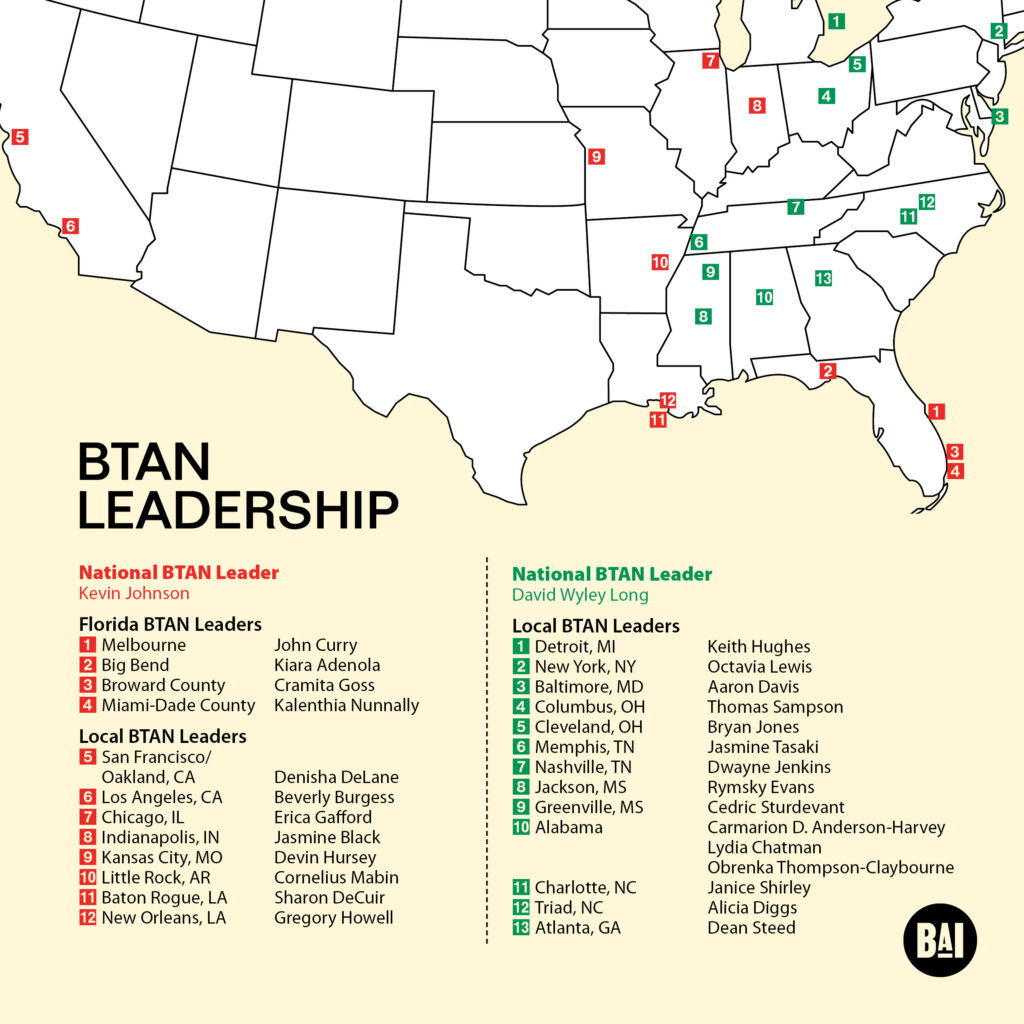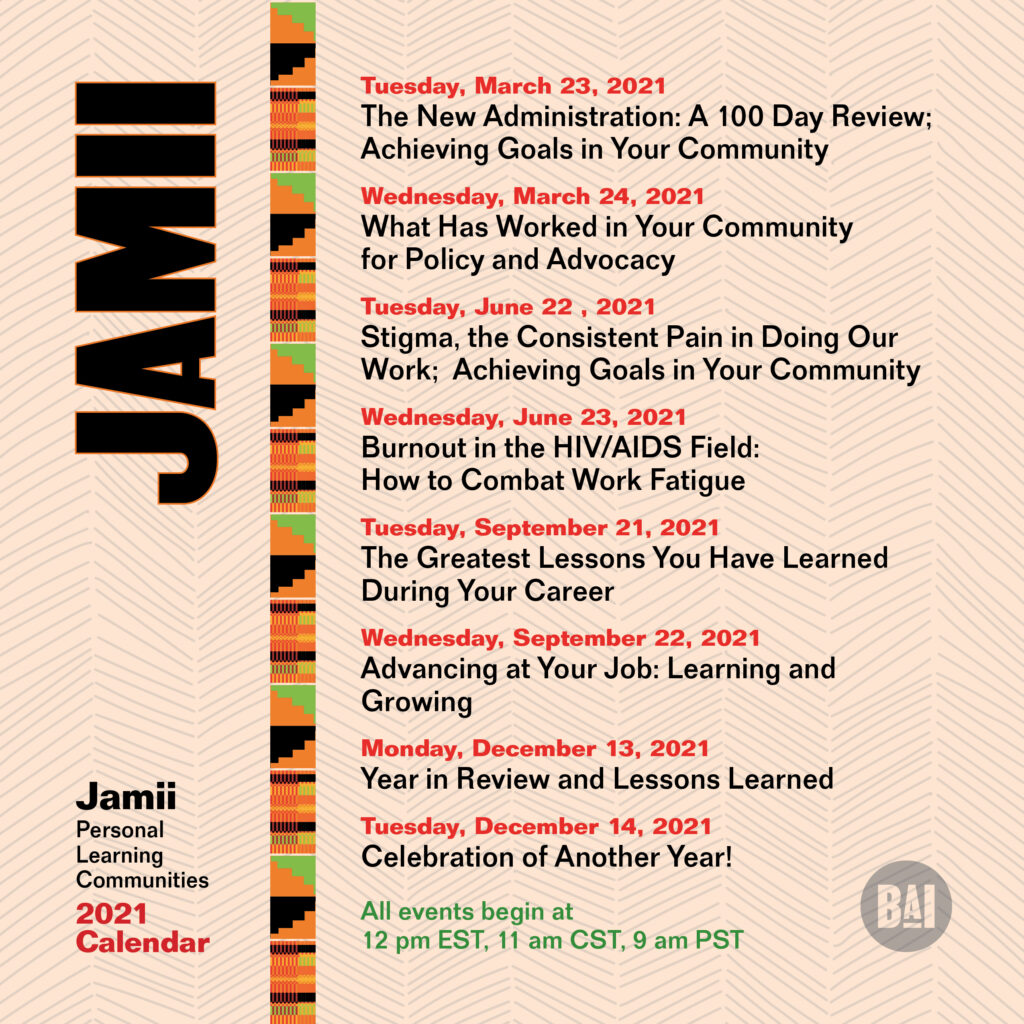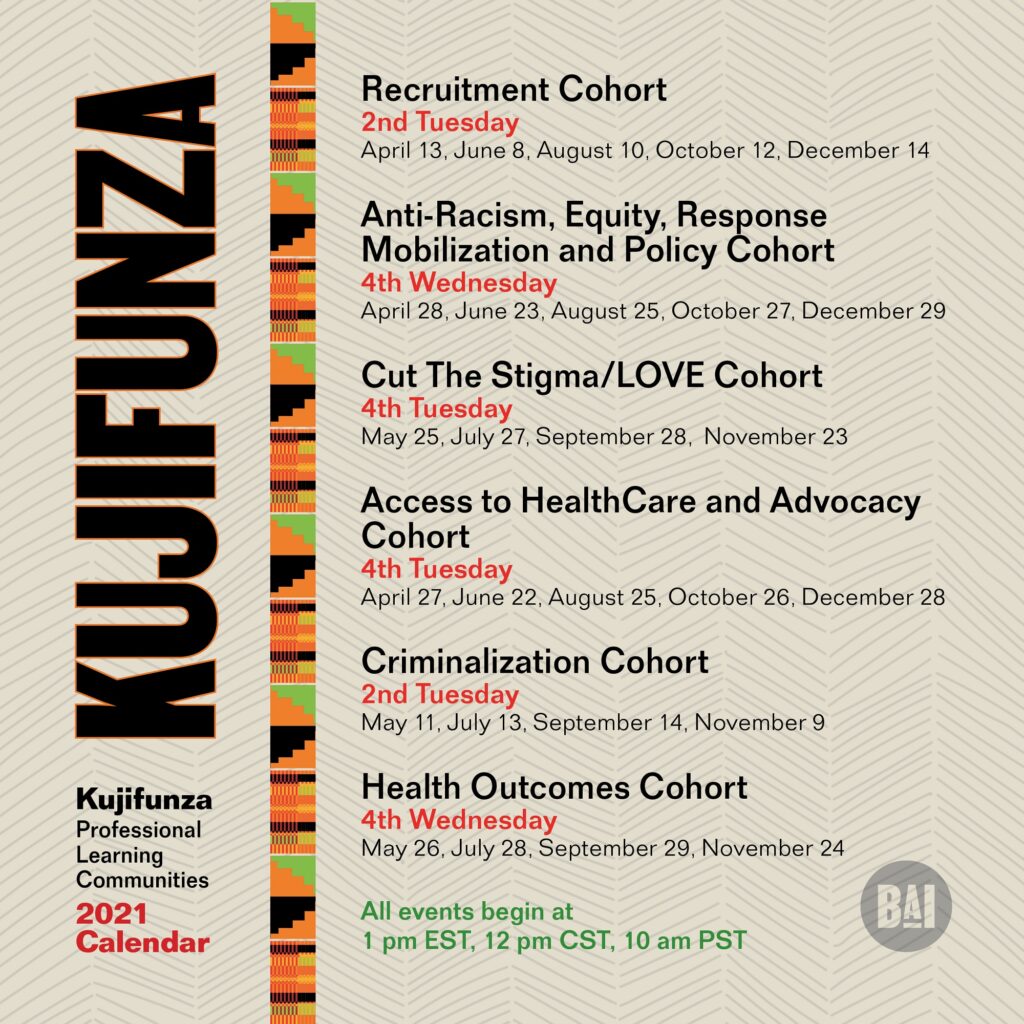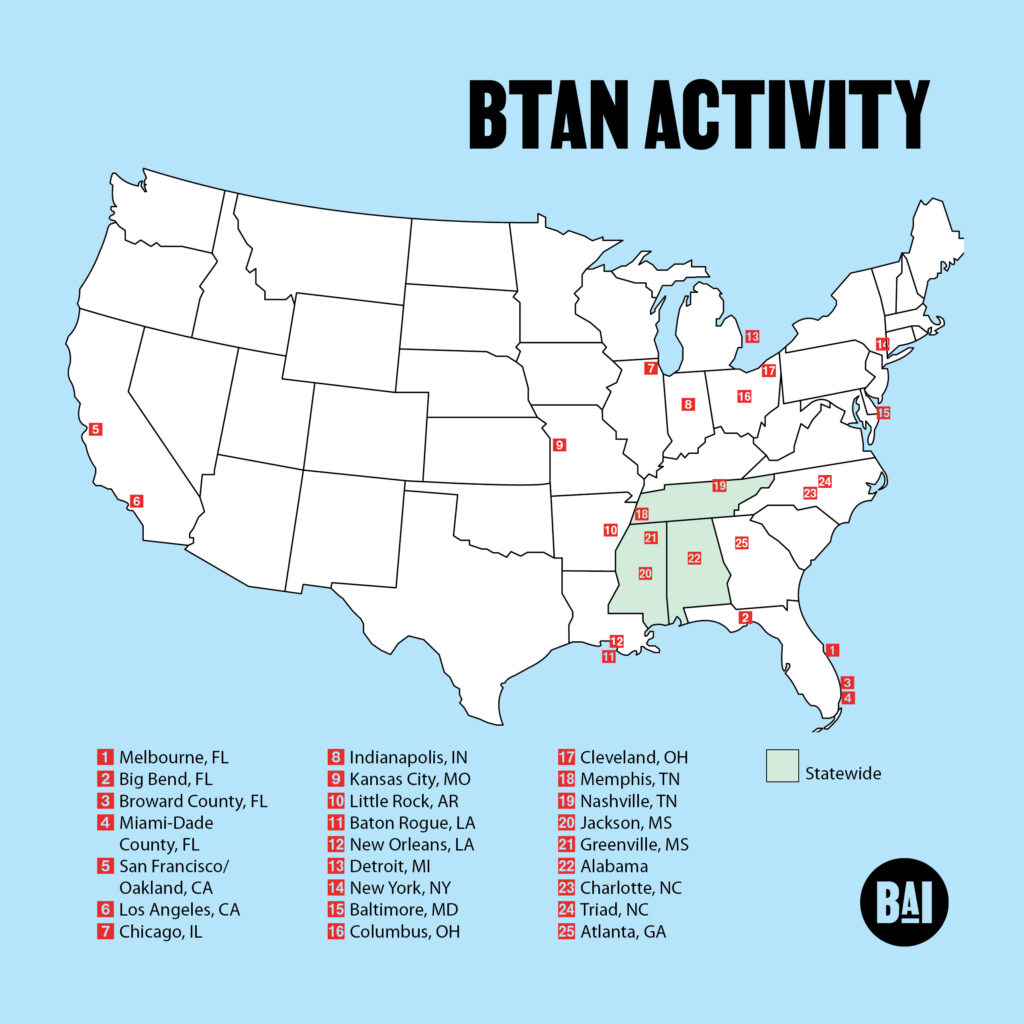OVERVIEW
Established in 2010 by the Black AIDS Institute, the Black Treatment Advocates Network (BTAN) is a national network of HIV/AIDS stakeholders including service providers, community members and leaders, educators, and people living with HIV/AIDS, who mobilize Black communities across the country to confront HIV.
BTAN facilitates the space for Black leaders to build collective power through intersectionality to end the epidemic. Its chapter-based structure is a unique offering for public health and racial justice advocates, as well as the HIV workforce, as it is designed to empower local leaders who know their community and can tailor their efforts to specific needs in each community. Therefore, while the goal of all BTANs is stigma reduction, capacity building, and community mobilization, the efforts may look different from inner-city New York to rural Mississippi.
There are currently 25 BTAN locations whose work is coordinated by BAI’s National Organizers. Mapped to the critical need for HIV advocacy in the U.S. South, the BTAN chapters are concentrated in the south, with efforts to expand the reach within Atlanta, as well cover more of the states in Mississippi, Alabama, and Tennessee.
Some of BTAN’s 2020-2021 accomplishments include hosting a series of ‘The Blacker The Plan Town Halls’, including talks with elected officials in Mississippi, Charlotte, and Detroit, growing the leaders professionally through Kujifunza and personally through Jamii, and shifting from in-person meetings to online sessions to maintain community education during COVID.
MISSION:
The Black Treatment Advocates Network aims to address the systemic barriers that perpetuate health disparities. To do this, BTAN’s main goals are to ensure there are enough Black-serving institutions and Black leaders with the skills, capacity, and social capital to ensure equitable access and utilization of up-to-date HIV prevention and treatment strategies for all Black people.
VISION:
BTAN is a well-informed and well-equipped collective of people who can address barriers specific to Black communities through knowledge transfer, advocacy, mobilization, and community building.
VALUES:
BTAN is unapologetically Black, inclusive, and informed by the community including Black people living with HIV (PLWHA). BTAN values the knowledge of HIV science, especially how it impacts our community. Most importantly, we believe local people know best how to respond to local problems.
NATIONAL STRUCTURE
BTAN is a national network of local chapters that are supervised and facilitated by BAI. The standard BTAN chapter model consists of three domains, education, leadership development, and community mobilization, from which all BTAN activities are derived. The National Organizers from Black AIDS Institute provide technical assistance to each BTAN chapter in various forms including content development and provision, guidance on community building and mobilization, and leadership development.
BTANs meet with other chapters during a monthly national leadership call. BAI staff provide organizers to each chapter to provide technical assistance, support, and training. There are monthly BTAN leadership calls every third Thursday at 1.00 PM EST.
BTAN CHAPTERS
FORMATION
They are formed based upon the initiative and interest groups at the local level who complete a rigorous, multi-step launch process. Once a chapter is formally recognized by the Black AIDS Institute, the chapter is then required to complete a variety of activities that meet BTAN’s overall goals. BTAN chapters meet monthly and put on regular programming that erodes the systemic barriers that fuel HIV in Black communities.
CHAPTER LOCATIONS
Chapters are established in geographic areas where Black communities face the highest impact of the HIV epidemic. With over 52% of new HIV diagnoses in the South, there is an effort to expand BTAN locations in those states.
BTAN Chapters
- Chicago, IL
- Charlotte, NC
- Detroit, MI
- Maryland (Baltimore)
- Baton Rouge, LA
- Bay Area, CA (Oakland)
- Melbourne, FL
- Broward County, FL
- Miami, FL
- Big Bend (Tallahassee FL)
- Atlanta, GA
- Alabama
- Mississippi (Jackson & The Delta/Greenville)
- Indianapolis
- Tennessee (Memphis and Nashville)
- Los Angeles, CA
BTAN Affiliates
- New Orleans, LA
- Cleveland, OH
- Houston, TX
- Dallas, TX
- New York, NY
- Kansas City, MO
- Durham, NC
- Richmond, VA

The BTAN program is critical to BAI’s efforts to end the epidemic as it builds local Black leadership and creates essential conversations around HIV, racism, and other intersecting issues. BTAN is continuously growing! To join a BTAN chapter or affiliate, or learn more about BTAN, please contact Senior National Organizer, David Wyley-Long or National Organizer, Kevin Johnson based on the location you are interested in (see Leader Map above).
BTAN Leadership Development Initiatives
Building and elevating Black leaders in the HIV community are a core part of the Black Treatment Advocates Network. Here are two initiatives that focus separately on the personal and professional development of BTAN leaders across the chapters.
JAMII: Personal Learning Community

Launched in 2020, “Jamii” which means “community” in Swahili, is a personal growth program for Black Treatment Advocates Network leaders.
We recognize the emotional stress and personal overwhelm that comes from “doing the work” in the HIV community.
The monthly events address topics that combine personal development, self-care, strategies to avoid burnout, lessons from local experiences, and more.
To join a BTAN chapter or affiliate, or learn more about BTAN, please contact Reverend Rob Newells, Director of National Programs, Black AIDS Institute at RobN@blackaids.org
Kujifunza: Professional Learning Community

A professional learning community (PLC) is a method to foster collaborative learning among colleagues within a particular work environment or field. It is often used in schools as a way to organize teachers into working groups of practice-based professional learning.
Using this same method our PLC model would aim to create cohorts of BTAN Leaders and members that will:
- Share current and relevant education and information amongst Leaders
- Discuss new, innovative, science-based, and black-centered solutions to end the epidemic (openness to new ideas)
- Share local, regional, and national best practices through BTAN Leaders
- Foster relationship building amongst BTAN’s
- Provide opportunities for BTAN Leaders to lead PLC discussions

